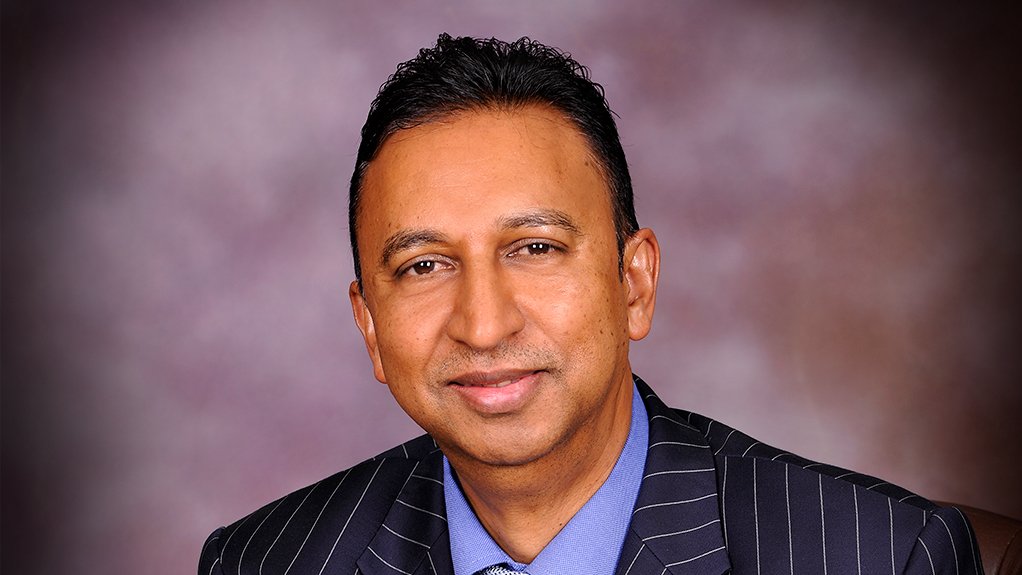Grid infrastructure holds potential for South Africa if properly leveraged – expert
Power and energy expert Vally Padayachee has emphasised the untapped potential and critical importance of optimising the country’s grid system, especially now as it transforms into a high-value smart grid that incorporates smart technologies and serves as a “backup” for renewable-energy power.
Padayachee, a former senior executive at City Power, in Johannesburg, and a former executive manager at Eskom, highlights, in an opinion article sent to Engineering News, the need for critical thinking, strategic investment, modernisation and a shift in thinking to address the challenges facing the South African energy landscape.
By recognising the grid as a transformative asset, the article calls for collaborative efforts to bolster grid infrastructure, which would engender a sustainable and prosperous energy future.
Padayachee advocates for proactive measures to unlock the full potential of the grid, turning challenges into opportunities.
He explains that the mix of challenges includes aging and inadequate infrastructure, frequent blackouts, high electricity prices and a heavy reliance on coal-fired power plants.
These issues have been exacerbated by, among other, mismanagement, corruption, State capture and a lack of long-term planning, he adds.
Despite these challenges, Padayachee highlights that there are opportunities for South Africa to transform its energy landscape and harness the potential of the grid.
He elaborates that the country has abundant access to low-carbon energy resources, including wind, solar, gas, nuclear and hydropower, which can be leveraged to diversify the energy mix and reduce dependence on fossil fuels (post the current electricity crisis) in a prudent, fit-for-purpose and just manner.
In this energy mix, Padayachee supports the increased use of renewable energy but stresses that this should be backed up by other always-on dispatchable technologies.
He points out, however, that the transition to a more sustainable energy system is not without its challenges.
The grid infrastructure must be upgraded and modernised to accommodate the integration of renewable-energy sources, which can be intermittent and variable. Moreover, regulatory frameworks and policies need to be revised to incentivise investment in clean energy technologies and promote energy efficiency, Padayachee says.
He posits that, by addressing the structural and operational challenges facing the grid, the country can pave the way for a brighter and more sustainable energy future.
Padayachee stresses that there must be a different approach - a new way of thinking - to address the serious challenges associated with the country’s energy landscape.
The article suggests that the grid has the potential to be an asset if properly prioritised, managed, used and optimised.
A well-designed and efficient grid system could provide stability, reliability and sustainability to the energy supply, benefiting both consumers and the overall economy.
Padayachee calls on stakeholders to prioritise grid modernisation and innovation, shaping a more resilient, efficient and sustainable energy landscape for the future.
The article highlights the high potential value of the grid, owing to the essential role of electricity in modern society, its economic impact, its importance for public health and safety, its contribution to environmental sustainability, and its significance for national security.
Padayachee posits that Eskom and municipalities, as owners of the national electricity grid, have the opportunity to leverage and monetise the opportunities the grid presents through the various grid products and services that can be “sold” to their respective customers.
The inherent value and characteristics of the grid must be enhanced, marketed and reflected in how the grid gets priced and sold now as it evolves to a smart grid that incorporates smart technologies and serves as a backup for renewables, he avers.
He says the value of the grid in these circumstances must therefore reflect, as a collective, an accounting value model, an economic value model and a market perception values model, or characteristics.
Specifically, the pricing model for the various grid-related products and services should migrate from the current “kilowatt-hour (energy)” commodity-type electricity utility business model with an opaque non-transparent “lumped-up” tariff model and be replaced with a grid services business model, Padayachee says.
Padayachee says the intrinsic value of a modern smart electricity grid lies in its ability to optimise energy efficiency, enhance grid reliability and resilience, integrate low-carbon sources, reduce carbon emissions, and enable advanced monitoring and control capabilities.
He posits that, by leveraging advanced technologies such as AI, digitalisation, machine language, sensors, meters, automation, and data analytics, a smart grid can improve overall energy management, reduce energy waste, lower costs for consumers, and enable more sustainable energy practices.
He mentions that a smart grid can facilitate the adoption of electric vehicles, energy storage systems, and other distributed energy resources, creating a more flexible and dynamic energy ecosystem.
Article Enquiry
Email Article
Save Article
Feedback
To advertise email advertising@creamermedia.co.za or click here
Announcements
What's On
Subscribe to improve your user experience...
Option 1 (equivalent of R125 a month):
Receive a weekly copy of Creamer Media's Engineering News & Mining Weekly magazine
(print copy for those in South Africa and e-magazine for those outside of South Africa)
Receive daily email newsletters
Access to full search results
Access archive of magazine back copies
Access to Projects in Progress
Access to ONE Research Report of your choice in PDF format
Option 2 (equivalent of R375 a month):
All benefits from Option 1
PLUS
Access to Creamer Media's Research Channel Africa for ALL Research Reports, in PDF format, on various industrial and mining sectors
including Electricity; Water; Energy Transition; Hydrogen; Roads, Rail and Ports; Coal; Gold; Platinum; Battery Metals; etc.
Already a subscriber?
Forgotten your password?
Receive weekly copy of Creamer Media's Engineering News & Mining Weekly magazine (print copy for those in South Africa and e-magazine for those outside of South Africa)
➕
Recieve daily email newsletters
➕
Access to full search results
➕
Access archive of magazine back copies
➕
Access to Projects in Progress
➕
Access to ONE Research Report of your choice in PDF format
RESEARCH CHANNEL AFRICA
R4500 (equivalent of R375 a month)
SUBSCRIBEAll benefits from Option 1
➕
Access to Creamer Media's Research Channel Africa for ALL Research Reports on various industrial and mining sectors, in PDF format, including on:
Electricity
➕
Water
➕
Energy Transition
➕
Hydrogen
➕
Roads, Rail and Ports
➕
Coal
➕
Gold
➕
Platinum
➕
Battery Metals
➕
etc.
Receive all benefits from Option 1 or Option 2 delivered to numerous people at your company
➕
Multiple User names and Passwords for simultaneous log-ins
➕
Intranet integration access to all in your organisation





















